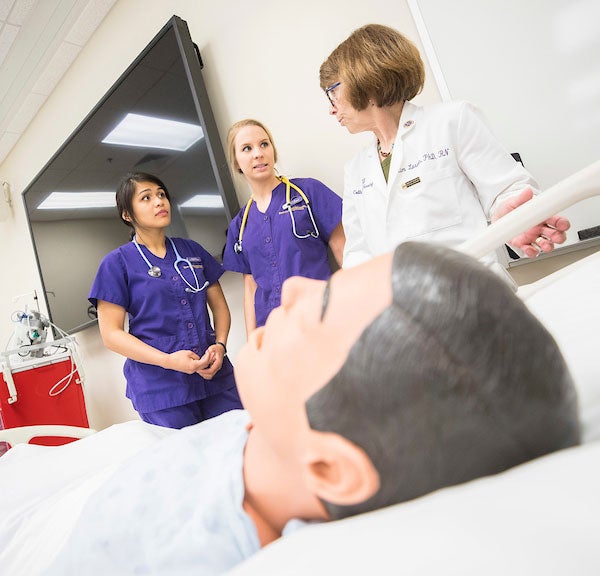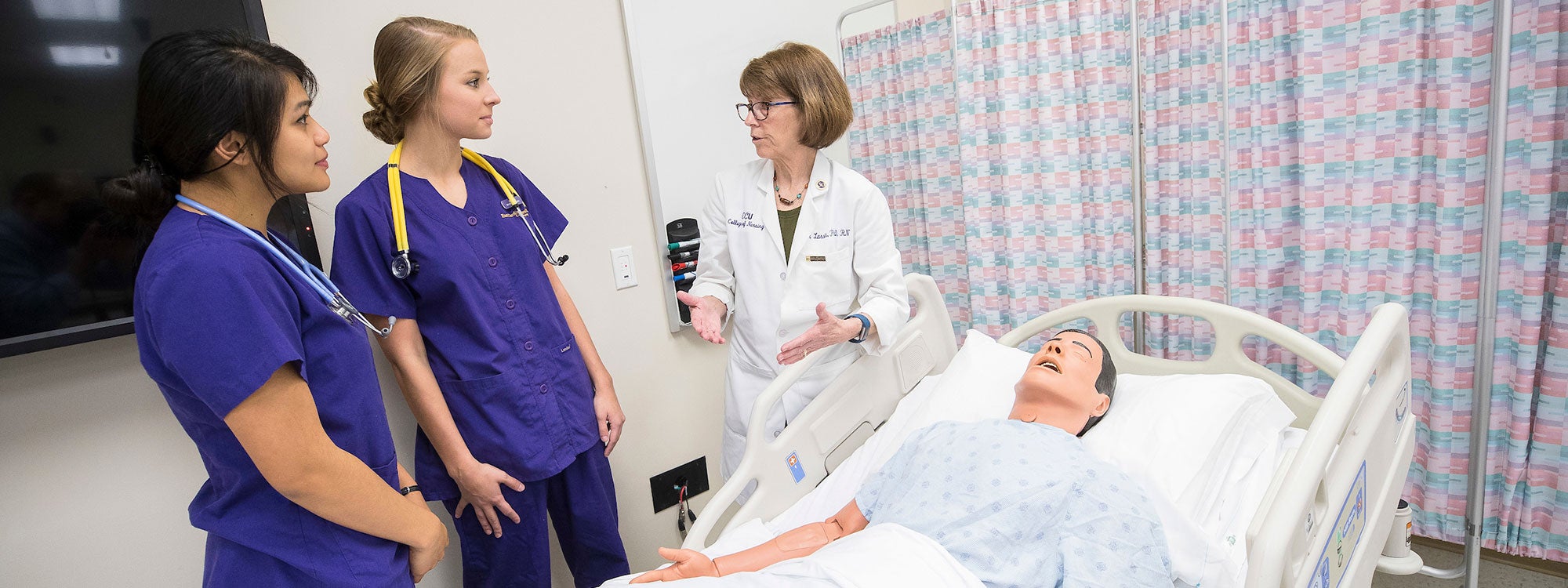IMPROVING PATIENT COMMUNICATION
Online medical Spanish program coming to ECU
East Carolina University students interested in careers in health care will soon have a new tool to help them better communicate with Spanish-speaking patients, a rapidly increasing segment of the state’s population.
Leadership of ECU’s Division of Health Sciences recently granted approval for an online medical Spanish program to be offered to students enrolled at the university.
The online course – hosted by Canopy, which is sponsored by the National Institutes of Health – teaches specialized medical concepts and terminology from a wide variety of common clinical scenarios to help medical students and professionals provide better care to Spanish-speaking patients.

Nursing students Graziella Dominado and Cluadia Woznichak talk with Dr. Kim Larson, associate professor at ECU’s College of Nursing.
“The real world is a bilingual world and we have a growing Latino population. Our students identified the need for medical Spanish and approached the faculty about it,” said Dr. Kim Larson, an associate professor with the College of Nursing, who also credited Laupus Library Director Elizabeth Ketterman for helping to bring the program to ECU.
According to the U.S. Census Bureau, North Carolina’s estimated Hispanic or Latino population, in terms of percentage of the state’s total population, nearly doubled – from 4.7 percent to 8.9 percent – between 2000 and 2016.
“The students are not becoming interpreters, they’re gaining knowledge and skills to be able to communicate, at a basic level, with their patients,” Larson said. “Some of the knowledge is the language and some is the culture, so that they’ll have a better knowledge base of the immigrant population that they will ultimately serve.”
Included in the online program – which has beginner, intermediate and advanced levels – is common terminology used for physical examinations and health histories, as well as lessons on how to explain surgical procedures and medication administration.
“I think it will provide an increased confidence and trust in the health profession, and take away some of the barriers for people to want to seek out help for their health needs sooner rather than later,” Larson said of the potential benefits of the program for patients.
Students who pass the tests to demonstrate competency in the aforementioned levels have their names entered into a national database. They can then show prospective employers proof of their extra level of medical Spanish competency.
Graziella Dominado, a junior nursing student from Raleigh, said that having access to a program like Canopy will make the ECU graduates more competitive and productive in the health care industry.
“I think that knowing another language, even if it’s just a little bit of that language, will undoubtedly make us more well-rounded providers, more empathetic and more encouraging, and help us to be better patient advocates in general, which is what our job is really all about,” Dominado said.
Prior to the online course, which is expected to be available to students this summer, the only medical Spanish course offered at ECU was an in-person course for about 10-20 students. However, Larson said that highly sought after course did not meet the demand of the large number of students who wanted to take it and that many medical and nursing students were also unable to take the course because it conflicted with their clinical hours.
“They’ll be able to take this course online, at home, 24/7,” Larson said.
Claudia Woznichak, a junior nursing major from Clayton, said she has a beginner’s level of Spanish knowledge, so she appreciates the benefit of having access to a medical Spanish course prior to starting a career in the modern health care industry.
“We know the Spanish-speaking population is growing. So being able to talk with our patients about their care, even if it’s at a basic level, will make everyone involved more comfortable,” Woznichak said. “If we’re able to communicate with our patients better and make them more comfortable, they’ll be more likely to comply with the care they are given and the directions for follow-up treatment that they receive.”
While ECU officials discussed offering an online medical Spanish program for a few years, Larson said, its implementation comes at an opportune time for the university.
“The timing is really in alignment with ECU’s strategic plan where ‘global’ is a major focus of the chancellor,” she said. “And when there is a new focus on global initiatives and on our students as ‘global citizens.’”
